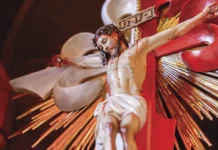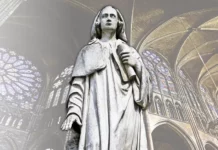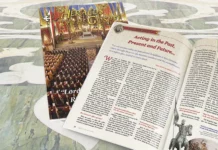Love is accompanied by hatred, as light by shadow. Those who adore the Lord combat idolatry; those who love virtue hate sin; those who honour God and the Saints hate the devil and his agents.
During this first quarter of the year, the coronavirus remains the dominant theme. The successive norms on this issue generally present a one-dimensional and not always “scientifically correct” approach. Some even cause bewilderment… not to mention the doses of “fake news” that circulate with the aim of deceiving public opinion.
“Sursum corda! – Lift up your hearts!” Let us turn to our monthly Eucharistic theme, which today we will approach from a different and provocative angle.
Church militant, pilgrim Church
Until recently, it was common to use the expression “Church Militant” to designate the portion of the Mystical Body of Christ made up of those living on this earth, for “the life of man upon earth is a warfare” (Job 7:1). Together with the Church Triumphant and Church Suffering, it constitutes the whole of the Holy Roman Catholic and Apostolic Church – another expression that is falling into disuse.
Today, preference is shown for the term “pilgrim Church”, which is not incorrect, but is less precise. In order to live up to the demands of our Faith, it is necessary to overcome obstacles, to deny ourselves, to carry the Cross. We must be militant! The grace of God gives us strength for this arduous commitment, and the Sacraments are vehicles of grace. That of Confirmation, for example, makes the baptized into soldiers of Christ.
The warfare Job announces is first of all in the spiritual field: “For we are not contending against flesh and blood, but against the principalities, against the powers, against the world rulers of this present darkness, against the spiritual hosts of wickedness in the heavenly places” (Eph 6:12). But it has ramifications in the material field, since deliberate and culpable evil also exists among men.
Holy warriors, models of Christian heroism
When Knighthood flourished in Christendom, giving rise to the feats of the Crusades – so heavily criticized today – admirable battles ensued, both in Europe and in the Middle East. Someone will object that human failings were certainly not absent among them. Yes, but even the most praiseworthy undertakings have been tarnished by the innate frailty of the children of Eve! The Crusades were promoted by the Popes, and Saints of the stature of St. Louis of France and St. Ferdinand of Castile took part in them.
Centuries later, St. Therese of the Child Jesus would declare: “I feel within my soul the courage of the Crusader, the Papal Guard, and I would want to die on the field of battle in defence of the Church.”1 Mere lyricism? A youthful flight of fancy? No. These are the words of a Doctor of the Church!
Moreover, the names of several warriors, models of Christian heroism, appear in the Liturgical Calendar. There are others who, without having entered personally into the battlefield, have promoted just wars, and in this way have deserved the honour of the altars. And there are many more brave defenders of the Faith who have conquered Heaven, although they have not been included in the index of canonized saints.
“I have not come to bring peace, but a sword”
In Sacred Scripture, conflicts between the faithful (etymologically, men with faith) and infidels (men without faith) are narrated at every turn. We should not be surprised, considering that after the fall of our first parents God said to the serpent: “I will put enmities between thee and the Woman, and thy seed and her seed: She shall crush thy head, and thou shalt lie in wait for her heel” (Gn 3:15).
It is an enmity established by God, not by human will or caprice. And the last among the Sacred Books contains the same truth: “Then the dragon was angry with the Woman, and went off to make war on the rest of her offspring, on those who keep the Commandments of God” (Rv 12:17).
Thus, the Bible opens and closes with this key teaching: life on earth is a constant battle, a continuation of that waged in Heaven: “Now war arose in Heaven, Michael and his Angels fighting against the dragon; and the dragon and his angels fought” (Rv 12:7).
In the Gospels we also find significant passages that point to this situation of warfare. Let us look at just two examples. First: Simeon said of Jesus at the time of the Presentation: “Behold, this Child is set for the fall and rising of many in Israel, and for a sign that is spoken against” (Lk 2:34). Second: the Lord himself said: “Do not think that I have come to bring peace on earth; I have not come to bring peace, but a sword” (Mt 10:34).
How to explain the apparent contradiction?
What should we draw from all of this? First, let us say with the Master: “Blessed are the peacemakers” (Mt 5:9). He taught us to love our enemies, to forgive them “seventy times seven” times (cf. Mt 18:21-22), to pray for those who persecute us (cf. Mt 5:43-44), etc. This too is in the Gospels. How, then, can we explain the apparent contradiction?
The solution is that love for “my person” is, so to speak, negotiable, but love for God is not. When it is a question of personal interests, I should yield and turn the other cheek, but God’s cause is sacred and non-negotiable… Unless one were to ignore the first Commandment, a summary of the whole Law.
It is a fact that the ideas and considerations of many Catholics have been affected by the miasmas of relativism, because they do not want to face an elementary truth: love is accompanied by hatred, as light by shadow. Those who adore the Lord combat idolatry; those who love virtue hate sin; those who honour God and the Saints hate the devil and his agents. How could it be otherwise? There is an incompatibility between light and darkness.
At this juncture, some readers may be surprised at the unusual course taken by this Eucharistic meditation which is drawing to a close. Nevertheless, this whole introduction, perhaps rather lengthy, brings us readily to our ongoing mission: the promotion of Eucharistic adoration.
Our “militancy” leads us to adore Jesus in the Host and to foster love for Him, and this implies being a “crusader for the Eucharist.” It is an undertaking, not to reconquer the Holy Sepulchre, but to exalt the Real Presence of the Risen Christ. In this struggle, we fight against ignorance and apathy with the weapons of word and example. Thus, we aim to overcome the widespread indifference of our brothers and sisters in the Faith and to lead them to the Bread of Heaven. Let us wage this “holy war” under the mantle of Our Lady, for She is “fair as the moon, bright as the sun, terrible as an army set in array” (Ct 6:9). ◊
Notes
1 ST. THERESE OF THE CHILD JESUS. Manuscrits autobiographiques. Manuscrit B, 2v.







